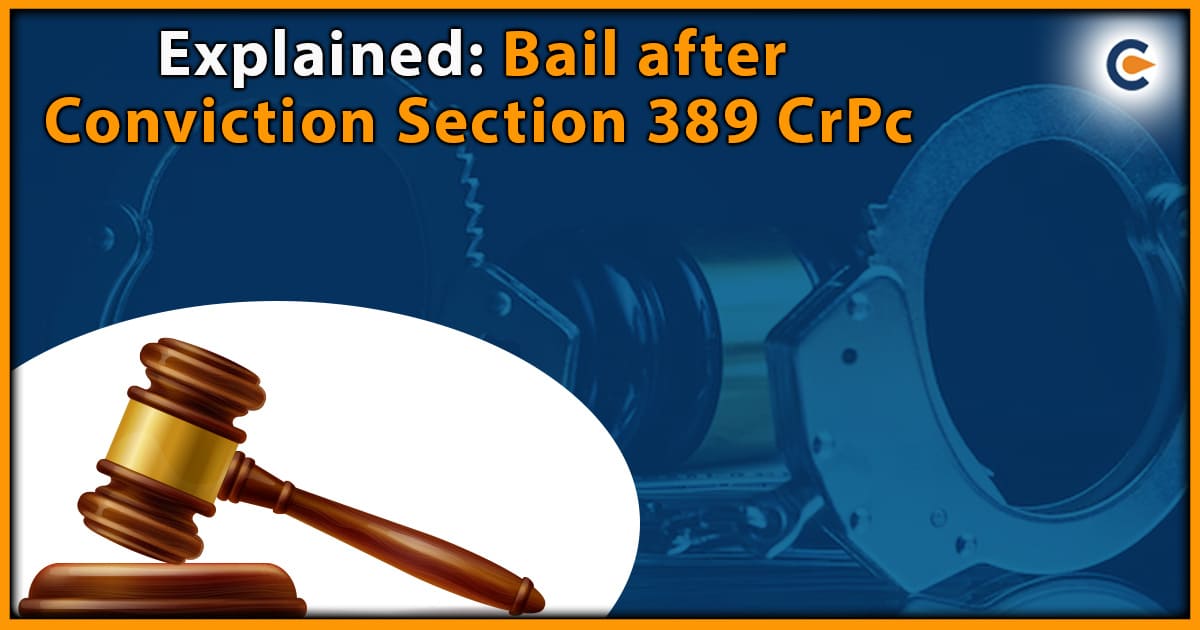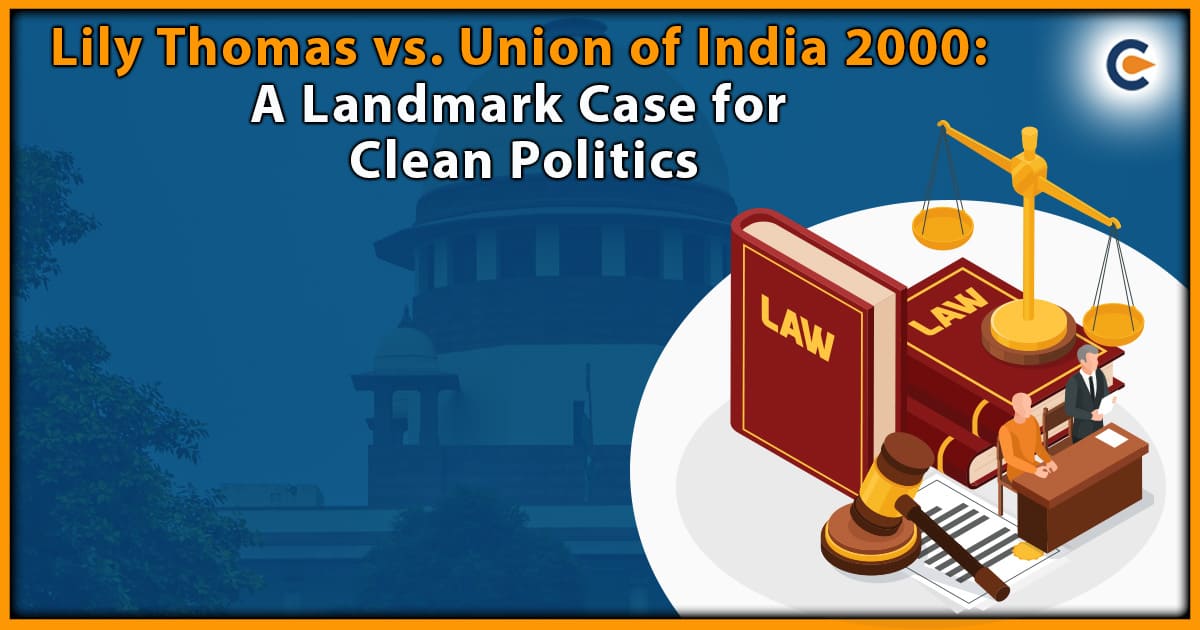Bail after conviction Section 389 of the Criminal Procedure Code (CrPc) deals with the power of the appellate court to suspend, remand or release a convicted person on bail. It applies to cases where a person has been convicted by a trial court and has filed an appeal against the conviction.
Under this section, the appellate court has the discretion to grant bail to a convicted person pending the hearing and final disposal of the appeal. The court may also suspend the sentence of the convicted person or remand them to custody during the pendency of the appeal.
The objective of Section 389 CrPc is to ensure that a person who has been convicted by a lower court but has appealed against the conviction, is not subjected to unnecessary incarceration until the appellate court decides on the appeal. The section also seeks to strike a balance between the interests of justice and the personal liberty of the convicted person.
Types of Bail under Section 389 CrPc
There are two types of bail that can be granted under Section 389 CrPc:
Regular Bail
Regular bail is granted when a person who has been convicted by a lower court is released on bail pending the hearing and final disposal of the appeal. The appellate court may grant regular bail if it is satisfied that the convicted person is not likely to abscond or tamper with the evidence, and that their release on bail will not pose a threat to public safety or the administration of justice.
Interim Bail
Interim bail is granted for a short period of time, usually during the pendency of the hearing of the bail application. Interim bail is granted to provide temporary relief to the convicted person while the appellate court is considering their bail application. Interim bail may be granted subject to conditions, such as a requirement to report to the police station regularly, surrendering their passport or refraining from contacting certain persons.
It is important to note that the grant of bail under Section 389 CrPc is subject to the discretion of the appellate court and may be granted with or without conditions, depending on the facts and circumstances of each case.
Eligibility Criteria for Bail after Conviction
The Eligibility Criteria For Bail After Conviction Under Section 389 Crpc Are As Follows:
The convicted person must have filed an appeal against the conviction in the appellate court.
The convicted person must have been sentenced to imprisonment for a term of three years or less. If the sentence is for more than three years, then the convicted person must first approach the High Court for bail under Section 439 CrPc.
The convicted person must satisfy the appellate court that there are reasonable grounds for believing that they are not guilty of the offense for which they were convicted, and that they will not abscond or tamper with the evidence if released on bail.
The convicted person must show that their continued incarceration pending the hearing and final disposal of the appeal will cause them irreparable harm or injustice, and that their release on bail will not be contrary to the interests of justice or public safety.
It is important to note that the appellate court has the discretion to grant or deny bail after conviction, even if the convicted person satisfies the eligibility criteria. The court will consider various factors, such as the nature of the offense, the severity of the sentence, the criminal record of the convicted person, and the likelihood of the convicted person fleeing from justice or interfering with the administration of justice.
Factors Considered by Courts in Granting Bail after Conviction
In deciding whether to grant bail after conviction under Section 389 CrPc, the appellate court will consider several factors, including:
Nature of Offense
The appellate court will consider the seriousness of the offense committed by the convicted person, the circumstances surrounding the commission of the offense, and the potential impact of the offense on public safety and the administration of justice.
Severity of Sentence
The appellate court will consider the length of the sentence imposed on the convicted person, the nature of the sentence (such as imprisonment or fine), and the time already spent by the convicted person in custody.
Criminal Record
The appellate court will consider the past criminal record of the convicted person, including any prior convictions, and the likelihood of the convicted person committing similar offenses if released on bail.
Flight Risk
The appellate court will consider whether the convicted person is likely to flee from justice or abscond if released on bail, and the measures that can be taken to ensure their presence during the hearing and final disposal of the appeal.
Tampering with Evidence
The appellate court will consider whether the convicted person is likely to tamper with the evidence or influence witnesses if released on bail.
Personal and Family Circumstances
The appellate court will consider the personal and family circumstances of the convicted person, such as their age, health, financial situation, and family obligations, to determine whether continued incarceration will cause them undue hardship or injustice.
Public Interest
The appellate court will consider the interest of the public in ensuring that the convicted person is brought to justice and that the administration of justice is not hampered.
The appellate court will weigh these factors and make a decision based on the facts and circumstances of each case.
Procedure for Obtaining Bail after Conviction
The procedure for obtaining bail after conviction under Section 389 CrPc is as follows:
Filing of Bail Application
The convicted person or their legal representative may file a bail application before the appellate court along with an affidavit stating the grounds for seeking bail.
Notice to Prosecutor
The appellate court will issue a notice to the prosecutor and give them an opportunity to file a reply to the bail application.
Hearing of Bail Application
The appellate court will hear the arguments of both parties and consider the factors mentioned above while deciding whether to grant or deny bail.
Conditions of Bail
If bail is granted, the appellate court may impose conditions such as a requirement to furnish a surety, surrender of passport, reporting to a police station at regular intervals, and refraining from contacting certain persons.
Bail Bond
The convicted person or their surety may be required to furnish a bail bond, which is a legal undertaking to ensure the presence of the convicted person during the hearing and final disposal of the appeal.
Compliance with Conditions
The convicted person must comply with the conditions of bail and failure to do so may result in cancellation of bail.
It is important to note that the procedure for obtaining bail after conviction may vary from state to state and from court to court. The convicted person or their legal representative should seek the advice of a competent lawyer who has experience in criminal law to navigate the bail process effectively.
Grounds for Cancellation of Bail after Conviction
The grounds for cancellation of bail after conviction under Section 389 CrPc are as follows:
Violation of Bail Conditions
If the convicted person violates any of the conditions of bail, such as failure to report to the police station or contact certain persons, the court may cancel the bail.
Commission of another Offense
If the convicted person commits another offense while on bail, the court may cancel the bail.
Tampering with Evidence or Witness
If there is evidence to suggest that the convicted person has tampered with the evidence or influenced a witness, the court may cancel the bail.
Fleeing from Justice
If the convicted person absconds or flees from justice, the court may cancel the bail and issue a warrant for their arrest.
Change in Circumstances
If there is a material change in the circumstances of the case, such as the discovery of new evidence, the court may cancel the bail.
Interference with the Administration of Justice
If the convicted person interferes with the administration of justice or attempts to obstruct the course of justice, the court may cancel the bail.
It is important to note that the court has the discretion to cancel the bail and the decision will depend on the facts and circumstances of each case. The convicted person or their legal representative should ensure that all conditions of bail are complied with and seek the advice of a competent lawyer if there is a change in circumstances that may affect their bail.
Case Studies on Bail after Conviction under Section 389 CrPc
Sure, here are a few case studies on bail after conviction under Section 389 CrPc:
Sanjay Chandra v. CBI
In this case, the managing director of a real estate company was convicted in a 2G scam case and sentenced to three years imprisonment. He filed a bail application under Section 389 CrPc, which was initially rejected by the trial court. However, the Delhi High Court granted him bail after considering his health condition and the fact that he had already spent two years in jail.
Narayan Rao Laxman Rao Jagdale v. State of Maharashtra
In this case, the accused was convicted of murdering his wife and sentenced to life imprisonment. He filed a bail application under Section 389 CrPc, which was rejected by the Bombay High Court. The court held that the seriousness of the offense, the likelihood of the accused absconding, and the possibility of tampering with evidence were sufficient grounds to deny bail.
Dinesh Kumar v. State of Haryana
In this case, the accused was convicted of murder and sentenced to life imprisonment. He filed a bail application under Section 389 CrPc, which was initially rejected by the trial court. However, the Punjab and Haryana High Court granted him bail after considering the fact that he had already served more than ten years in jail, his good conduct in jail, and the fact that the appeal against his conviction was likely to take several years.
State of Karnataka v. B.R. Nagaraj
In this case, the accused was convicted of embezzlement and sentenced to five years imprisonment. He filed a bail application under Section 389 CrPc, which was rejected by the trial court. The Karnataka High Court upheld the decision of the trial court and held that the seriousness of the offense and the possibility of the accused absconding were sufficient grounds to deny bail.
These case studies demonstrate that the decision to grant or deny bail after conviction under Section 389 CrPc depends on the facts and circumstances of each case and the discretion of the court.
Recent Amendments to Section 389 CrPc
As of my knowledge cut-off in September 2021, there were no recent amendments to Section 389 CrPc. However, it is important to note that the law is subject to change and amendments may be made from time to time to keep up with the changing legal landscape and to address any gaps or inadequacies in the existing legal framework. It is therefore advisable to keep abreast of any changes or amendments to Section 389 CrPc by consulting a competent lawyer or staying updated with legal news and developments.
Key Differences between Bail before and after Conviction
The key differences between bail before and after conviction are as follows:
Stage of the Criminal Proceedings
Bail before conviction is granted during the pendency of the trial, while bail after conviction is granted after the accused person has been convicted and sentenced.
Burden of Proof
In bail before conviction, the burden of proof is on the prosecution to establish that the accused person should not be granted bail. In bail after conviction, the burden of proof is on the accused person to establish that they are eligible for bail and that there are sufficient grounds for granting bail.
Eligibility Criteria
The eligibility criteria for bail before conviction are different from those for bail after conviction. In bail before conviction, the accused person may be granted bail if they can establish that there are no substantial grounds for believing that they have committed the offense. In bail after conviction, the accused person must establish that there are special reasons for granting bail, such as ill-health or the pendency of an appeal.
Nature of the Offense
Bail before conviction may be granted for both bailable and non-bailable offenses, while bail after conviction is generally only granted for bailable offenses.
Discretion of the Court
The court has greater discretion in granting bail before conviction, as there is a presumption of innocence in favour of the accused person. However, after conviction, the court must consider the nature of the offense, the likelihood of the accused person absconding, and the possibility of the accused person tampering with evidence or influencing witnesses.
These are some of the key differences between bail before and after conviction. It is important to note that the rules and procedures relating to bail may vary depending on the jurisdiction and the specific facts and circumstances of each case.
Key Takeaways on Bail after Conviction under Section 389 CrPc
To conclude, bail after conviction under Section 389 CrPc is a legal provision that allows an accused person to be released on bail after they have been convicted and sentenced by a court of law. The eligibility criteria for bail after conviction are different from those for bail before conviction, and the court must consider various factors before granting bail, such as the nature of the offense, the likelihood of the accused person absconding, and the possibility of the accused person tampering with evidence or influencing witnesses.
Some Key Takeaways On Bail After Conviction Under Section 389 Crpc Are:
- Bail after conviction is not an automatic right and the accused person must establish that there are special reasons for granting bail.
- The court has the discretion to grant or deny bail after conviction based on the facts and circumstances of each case.
- The eligibility criteria for bail after conviction are different from those for bail before conviction, and the burden of proof is on the accused person to establish that they are eligible for bail.
- Bail after conviction is generally only granted for bailable offenses and in exceptional circumstances for non-bailable offenses.
- It is important for the accused person to follow the correct procedure for obtaining bail after conviction and to seek the assistance of a competent lawyer to present their case effectively.
Conclusion
In conclusion, bail after conviction under Section 389 CrPc[1] is a complex legal provision that requires careful consideration of various factors by the court. It is important for the accused person to understand the legal framework and the eligibility criteria for bail after conviction, and to seek the assistance of a competent lawyer to present their case effectively.
Read Our Article: Detailed Guidelines For Arrest And Bail Under GST











